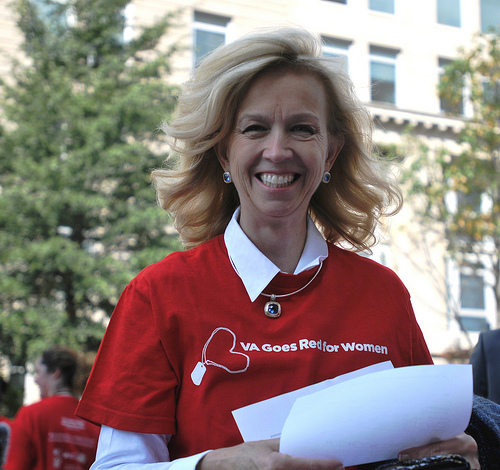
I’m among the 55 percent who knew heart disease is our number one killer, but I had no idea of the risk factors. Even more alarming is that heart disease is the number one killer of women Veterans too. I found this statistic interesting since I would have thought women Veterans would be less likely than our counterparts to have heart disease since our military training taught us the value of exercise, eating well, and being mentally and physically tough.
But as VA Under Secretary for Benefits Allison A. Hickey made clear as she spoke to women at VA Goes Red for Women in Washington, D.C. Thursday, women Veterans are just as likely to make excuses as any women when it comes to their health. Hickey said the statistics “should be a wakeup call for all women,” and that she too has made excuses to ignore her health. It’s easy to do, there just doesn’t seem to be enough hours in the day for work, family, and taking care of ourselves. As a mother of a toddler, I often justify chicken nuggets for dinner (again) and chasing a toddler as the only work out I need. And while there are risk factors out of my control, like gender, age, heredity and race, there are plenty of risk factors I can and should control. Lowering cholesterol and blood pressure, quitting smoking, being active, reducing stress, and shedding excess pounds can all go a long way to reduce the risk of heart disease.

VA Undersecretary for Benefits Allison Hickey was on hand to raise awareness of heart disease in women, particularly women Veterans and VA employees, at a “VA Goes Red” health expo
Hickey shared with us how she decided enough was enough and that she was going to eat better and exercise. By being at her very best every day, she ensures the Veterans we serve get her very best. She has lost 65 lbs in the last eight months and even though I see her a couple times a week at work, the change has been noticeable. I’m often in awe of her stamina and ability to retain all types of information – the secret to which, Hickey said is her new outlook on health.
According to the American Heart Association, women experience heart attacks differently than men do. Symptoms include:
- Uncomfortable pressure, squeezing, fullness or pain in the center of your chest. It lasts more than a few minutes, or goes away and comes back.
- Pain or discomfort in one or both arms, the back, neck, jaw or stomach.
- Shortness of breath with or without chest discomfort.
- Other signs such as breaking out in a cold sweat, nausea or lightheadedness.
As with men, women’s most common heart attack symptom is chest pain or discomfort. But women are somewhat more likely than men to experience some of the other common symptoms, particularly shortness of breath, nausea/vomiting and back or jaw pain.
VA knows that women are our fastest growing Veteran population. That’s why VA is working to ensure women Veterans understand the benefits and health care available to them through a partnership with the American Heart Association. We’re working to improve and increase heart disease prevention.
“Let VA help you with your health care and other benefits,” Hickey said. “Even small changes in your habits can make a big difference.”
Cat Trombley is a communications specialist with the Veterans Benefits Administration. Prior to working for VA, she was an assistant director at a Veteran Service Organization and represented Veterans before the Board of Veterans’ Appeals. She is also an Air Force Veteran.
Topics in this story
More Stories
The Social Security Administration is hoping to make applying for Supplemental Security Income (SSI) a whole lot easier, announcing it will start offering online, streamlined applications for some applicants.
Yusuf Henriques, an Army Veteran and former combat medic, is the founder and CEO of IndyGeneUS AI, a genomics company on a mission to improve health equity by increasing representation of women and racial minorities in clinical trials.
Online shopping scams are the riskiest scam for Veterans, with 77.3% of reports confirmed losing money when targeted by this scam.







I am retired Air Force. I applied for VA benefits because I have a foot injury, but was denied because “my husband made too much money”. I have had the listed symptoms before I retired and have family history of heart disease. What am I to do?
Marianne, Did you apply for disability compensation or for medical benefits? If you applied for medical benefits you may have been denied if your foot has not been found service connected. I suggest working with a county, state or Veterans Service Organization to help you file a claim to get your foot service connected. Once it is service connected, VA will treat it free of charge. Thank you for your service.